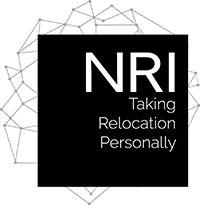
Are employee relocation expenses taxable? When crafting a comprehensive corporate relocation policy, taxation is a crucial factor that cannot be overlooked.
Whether your company is considering a relocation lump sum bonus, reimbursement, or a comprehensive managed corporate relocation service, each option has its own tax implications.
Failing to account for these considerations can lead to unwelcome surprises for employees, resulting in dissatisfaction with their new employer or their transfer and increased turnover or failed assignments.
It’s the employer’s responsibility to understand when relocation expenses are taxable, but NRI is here to help! As a professional corporate relocation partner, we will shed light on the tax considerations surrounding employee relocation, providing insights for employers to navigate this complex topic responsibly.
It’s important to note that while we strive to offer valuable information, this is not professional tax advice. Employers are strongly advised to consult with a certified public accountant (CPA) for personalized guidance tailored to their specific situation.
Moving Expenses, Tax Deductible Prior to 2018
Taxable relocation expenses and moving tax deductions were very different before the 2018 Tax Cuts and Jobs Act went into effect. Prior to 2018, relocating employees had the opportunity to benefit from tax deductions on specific moving expenses.
The eligibility criteria for these pre-2018 deductions consisted of passing both the Time and Distance tests.
The Time Test required employees to work full-time near their new job location for a minimum of 39 weeks within the first 12 months following the move.
Simultaneously, the Distance Test mandated that the new workplace must be at least 50 miles farther from the old residence than the previous workplace.
Under these criteria, certain moving expenses were tax-deductible prior to 2018, including:
- Transport of household goods
- Travel expenses, including airfare and lodging
- Storage of household goods
However, the 2018 tax law eliminated these deductions, made relocation expenses taxable, and reshaped the tax landscape for transferring employees.

Current Relocation Expense Tax Deductions in 2024
Since 2018 and extending at least until the 2025 tax year, there are no federal tax deductions available for moving expenses for most individuals. This law made relocation expenses taxable.
Notably, members of the armed forces undergoing service-related relocations are an exception and are still eligible for certain moving expense deductions.
There are also instances where moving expenses can still be deducted at the state level.
U.S. States With Moving Expense State Tax Deductions
Some states have retained the ability for residents to claim deductions for moving expenses on their state income tax returns. Employers and individuals undergoing relocations should be aware of such state-specific provisions, as they can provide some relief in the absence of federal deductions.
Several U.S. states provide state tax deductions for moving expenses, offering a potential financial benefit for relocating individuals:
- Pennsylvania
- New York
- Massachusetts
- New Jersey
- Arkansas
- California
- Hawaii
Is a Lump Sum Relocation Bonus Taxable to the Employee?
A lump sum relocation bonus is indeed considered taxable income for the employee. This means that the bonus, when added to the individual’s regular income, contributes to the calculation of their total taxable income for the respective tax year.
If an employee receives a relocation bonus of $10,000 and has an annual salary of $130,000, their total taxable income for the year would be $140,000.
It is crucial for employers to transparently communicate the tax implications of relocation bonuses to their employees. Failing to do so may lead to unforeseen tax burdens, potential dissatisfaction, and financial stress for the relocating employees. Clear communication ensures a smoother relocation process for the employer and the employee.

Is a Relocation Reimbursement Taxable to the Employee?
Similarly, relocation reimbursements are considered taxable income for the employee. Unlike the previous tax landscape, where moving expenses were deductible, employees currently cannot offset their moving expenses against their income. Instead, the reimbursement they receive is taxed as income.
For instance, if an employee incurs $5,000 in relocation expenses and receives a reimbursement of the same amount, their total taxable income for the year would include both their regular income and the $5,000 reimbursement.
Employers need to proactively communicate the tax implications of relocation reimbursements to their employees in order to help them navigate their financial responsibilities effectively and minimize potential unexpected tax burdens during the relocation process.
Are Corporate Relocation Packages & Relocation Assistance Taxable to the Employee?
Corporate relocation packages and managed relocation assistance are also taxable to the employee. In the case of managed relocation benefits, the employee is required to include the value of these benefits in their taxable income.
For example, if a managed relocation service is provided with an estimated value of $15,000, this amount is added to the calculation of the employee’s total taxable income for the tax year.
Again, proactive employer communication empowers employees to make informed decisions and effectively plan for any tax obligations associated with the relocation benefits they receive.

Global Mobility Tax: Employee Taxes When Moving Abroad
Global mobility tax introduces complex implications for employees moving abroad, whether for short-term assignments or long-term relocations.
Employees may find themselves obligated to pay taxes in both their home country and the host country, leading to potential double taxation. The specific tax obligations vary significantly depending on the tax laws of the host and home countries.
Some countries have bilateral tax treaties to alleviate the impact of double taxation. However, navigating these global mobility tax intricacies requires a nuanced understanding of the tax codes in both the host and home countries.
Countries where employees may encounter double taxation issues generally have stringent tax regulations or no comprehensive tax treaties to mitigate such situations. Some such countries include:
- The United States
- Canada
- The United Kingdom
- Germany
- Australia
- China
- Japan
Mitigating Taxable Relocation Expenses
Gross Up For Taxable Relocation Expenses, Reimbursements & Managed Relocation
To alleviate the tax burden on employees arising from taxable relocation expenses, reimbursements, and managed relocations, employers often employ a strategy known as “gross up.”
Grossing up involves increasing the amount of compensation provided to an employee to cover the additional taxes incurred due to the relocation benefits. This ensures that the employee receives a net amount after taxes, effectively neutralizing the impact of taxation on their take-home pay.
The process of grossing up is relatively straightforward. Suppose an employee is entitled to a $10,000 relocation bonus, and the combined applicable federal and state tax rate is 25%. To ensure the employee receives the full $10,000 after taxes, the employer would gross up the bonus by dividing it by the net percentage (100% – 25% = 75%). In this example, the grossed-up bonus would be $10,000 / 0.75, resulting in approximately $13,333
Offering gross up demonstrates an employer’s commitment to alleviating the financial impact of taxes on their employees and serves as a powerful incentive. By ensuring that the employee receives the intended compensation after taxes, employers can motivate individuals to accept job offers or agree to relocations. This approach fosters a positive work environment, enhances employee satisfaction, and contributes to reduced turnover rates.
Employers should also be cautious when offering relocation bonuses to avoid inadvertently pushing employees into higher tax brackets, which could result in higher tax liabilities for the employee. Careful consideration and transparent communication regarding the gross-up process contribute to a smoother relocation experience and a more contented workforce.
Global Mobility Tax Equalization
Employers often implement tax equalization in global mobility to address the intricate tax implications associated with international relocations. Tax equalization is a practice where the employer commits to maintaining the employee’s tax burden at a level comparable to what they would have experienced in their home country, even though they are now working abroad. This involves the employer covering any additional taxes the employee incurs due to the new host country’s tax laws.

Offering tax equalization not only ensures fairness for employees but also serves as a vital tool for talent retention and attraction in the global workforce. By mitigating the financial impact of varying tax structures, employers make international assignments more appealing, fostering a sense of security and stability for employees working abroad. This approach helps companies attract top talent, retain skilled professionals, and build a positive reputation as an employer that values and supports its globally mobile workforce.
Non-Taxable Relocation Expense: Home Sale Programs
One of the remaining strategies for employers to reduce taxes on relocation benefits for both themselves and their employees is through home sale programs. These programs provide a non-taxable avenue for employers to assist employees in selling their homes during a relocation.
The employer typically partners with a relocation service provider to manage the home sale process. By doing so, the employee receives support in selling their home efficiently, and the employer benefits from potential tax advantages.
For more detailed information on home sale programs and how they can be tailored to your organization’s needs, refer to our Home Sale Options.
As corporate relocation experts, it’s essential to emphasize that we are not tax experts or CPAs. Therefore, NRI strongly recommends that companies consult with their CPA or tax professional to ensure compliance with the latest tax regulations and to receive tailored advice based on their specific circumstances.
Use a Corporate Relocation Company to Optimize Employee Relocation Taxes
Navigating the complexities of employee relocation taxes can be a daunting task, and that’s where corporate relocation companies prove invaluable. With tax laws constantly evolving and presenting intricate challenges, outsourcing corporate relocation benefits to a specialized corporate relocation company is a strategic move.
NRI Relocation is well-versed in the intricacies of tax implications associated with relocations and can streamline the process for both employers and employees. By entrusting the management of relocation benefits to experts, employers can ensure compliance with tax regulations, minimize potential risks, and provide clarity to all parties involved.
This approach simplifies the tax-related aspects of corporate relocations and allows companies to focus on their core operations while ensuring a smooth and tax-efficient relocation experience for their employees.

Protect Employees From Relocation Taxes
Managing relocation taxes shouldn’t be a burden placed on your employees. A dedicated corporate relocation partner can assist in managing gross-up and tax equalization, ensuring that employees receive fair and transparent treatment throughout the process.
They can also communicate tax implications to employees, allowing them to make informed decisions and fostering a positive relocation experience.
Save with Corporate Relocation Tax Strategies
Unlock substantial savings by implementing corporate relocation tax strategies. Expert corporate relocation services go beyond managing the logistics; they help organizations identify opportunities to minimize taxes linked to relocation benefits.
Strategies such as home sale programs are employed to optimize tax efficiency, providing a win-win solution for both employers and employees. By leveraging these tailored tax approaches, companies can achieve cost savings, enhance financial efficiency, and ensure their relocation programs align with their broader financial goals.
Easy Relocation Expense Tax Management With Reporting
Streamline your relocation expense tax management with comprehensive reporting solutions. A reliable corporate relocation company facilitates the meticulous tracking of all relocation expenses, ensuring accuracy and compliance. With advanced reporting capabilities, your corporate relocation partner can efficiently calculate and prepare the necessary documentation for tax reporting purposes.
This professional process simplifies administrative tasks and enhances transparency, providing employers with a clear overview of relocation-related financials. Accurate tracking and reporting are instrumental in fostering efficiency and accountability throughout the relocation expense management.
Relocation & Global Mobility Tax Compliance
Ensure tax compliance for relocation and global mobility with specialized corporate relocation services. Navigating the intricate landscape of tax regulations becomes even more complex when global mobility is involved.
Corporate relocation experts stay vigilant, tracking numerous details to keep companies tax-compliant. This includes adhering to tax laws in the United States and in all countries where an employee lives and works.
By maintaining a comprehensive understanding of the tax requirements across borders, these services play a crucial role in mitigating risks and ensuring that companies seamlessly adhere to tax compliance standards in every aspect of their relocation and global mobility initiatives.

Better Management For Global Mobility & Corporate Relocation Taxes Starts Today
Today, more than ever, companies need comprehensive solutions to navigate the intricacies that make relocation expenses taxable. NRI Relocation is your trusted partner in this journey, offering expertise and tailored strategies to optimize your tax outcomes.
Don’t let the complexities of global mobility and corporate relocation taxes become a hurdle for your organization and employees. Take the first step toward better tax management by contacting NRI Relocation today.
Our dedicated team is ready to guide you through the process, ensuring compliance, transparency, and financial efficiency in your relocation assignments. Your company’s cost savings and employee satisfaction start with us.

